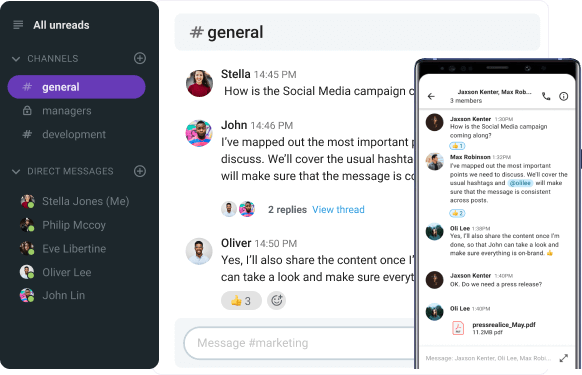Have you ever had a meeting with your boss’ boss? How about with one of your subordinate’s team members?
In both cases, this meeting would have been called a skip-level meeting.
But, what could an employee possibly discuss with their manager’s superior?
Well, that’s one of the questions we’re going to answer in this article.
In addition to that, we’ll also share:
- What you can expect from a skip-level meeting,
- How to prepare for a meeting with your manager’s boss,
- Templates you can use to ask for a skip-level meeting, and
- The pros and cons of these types of meetings.
But, before we get to any of that, let’s start by defining a skip-level meeting.

- A skip-level meeting is a meeting between a higher-up and an employee (or a group of employees) without the presence of their direct manager.
- These meetings expand the attendees’ understanding of the organization, provide opportunities to influence the company’s activities, and build relationships between employees and higher-ups.
- You can prepare for a skip-level meeting by checking the agenda, anticipating any questions you might be asked, and preparing your own inquiries ahead of time.
- Even though skip-level meetings can encourage transparent communication and make employees feel valued, they can sometimes lead to miscommunication, mismanaged expectations, and perceptions of favoritism.
What is a skip-level meeting?
A skip-level meeting is a meeting between a higher-up and an employee (or a group of employees) without the presence of their direct manager.
However, we should note that this adjective isn’t exclusively used to describe a type of meeting.
Rather, the term “skip-level” is an indicator of the hierarchical “distance” between an employee and a higher-up.
So, anyone who sits above your manager on the company ladder can be referred to as your skip-level manager or boss.
And, vice versa, any conversation you might have with an employee who is being managed by someone who reports directly to you could be deemed a skip-level conversation.
On a similar note, “skip-level” can be used to describe a type of leadership, as evidenced by a study on the importance of skip-level management, Speaking Up to Higher-Ups: How Supervisors and Skip-Level Leaders Influence Employee Voice.
The paper in question noted how skip-level leadership can alleviate the potential consequences that may occur when employees feel reluctant to report irregularities to their supervisors due to the supervisors’ carelessness or active suppression of dissenting voices.
But, of course, that is only one of the potential goals of skip-level meetings.
To discover more, let’s look into the purpose of having skip-level conversations.
What is the purpose of a skip-level meeting?
Most experts believe that the purpose of skip-level meetings is to:
- Expand the attendees’ understanding of a company’s current activities and future plans,
- Provide opportunities to influence those aspects of the organization, and even
- Build relationships between employees and higher-ups.
To learn more, we spoke with Robert Choi, founder of The Gov Coach and author of The Art of Public Service.
Drawing on his experience working as the Deputy Chief of HR at New York’s Metropolitan Transit Authority and, previously, the Central Intelligence Agency, Choi explained that skip-level meetings allow employees to circumvent traditional hierarchical communication:

“Skip-level meetings [are] vital tools for fostering transparency and innovation within an organization. They provide a unique platform where employees can share unfiltered insights, ideas, and concerns that might otherwise remain unheard in the traditional hierarchical communication structure. These meetings are not just for addressing issues; they’re also opportunities for senior leaders like myself to connect with the workforce at different levels, gaining a deeper understanding of the organizational culture and employee morale.”
Choi also noted that these kinds of meetings are particularly important in the public sector, though his reasoning could just as easily be applied to other industries:

“[Skip-level meetings] are essential for bridging the gap between various levels of the organization, fostering a sense of inclusivity and openness.”
What to expect in a skip-level meeting?
Ultimately, getting invited to a skip-level meeting is enough to tell you that your manager won’t be present — and not much else.
So, is there such a thing as a standard skip-level meeting agenda?
Well, according to Elena Sarango-Muniz of Sarango Executive Coaching, an HR and leadership consultant with over 25 years of experience in delivering leadership coaching workshops in global corporate settings, skip-level meetings are usually prompted by a specific need:

“[Skip-level] meetings are usually unstructured and not regularly scheduled, although good leaders would have this as part of their set communication strategy. They are mostly prompted by a need:
- Manager not performing,
- Engagement in the department is low, or
- The leader requesting it is new to the organization and wants to meet the team, get their feedback on what he/she should focus on.”
So, without knowing the meeting agenda, we won’t be able to help you adjust your expectations ahead of your skip-level meeting.
Some skip-level meetings may not require anything of you and may, in fact, just be informative or educational.
On the other hand, if you’re called upon to share skip-level feedback, that may require more preparation on your end.
With that being said, let’s talk about how to prepare for a skip-level meeting.
8 tips to prepare for a skip-level meeting as an employee
As we have established, the process of preparing for a skip-level meeting usually depends on its purpose.
Even so, the following tips should be useful in most cases:
- Check the agenda (or make one),
- Research the person you’re meeting,
- Ask your coworkers what you can expect,
- Prepare a list of things you enjoy about working at the company,
- Identify the difficulties you’re having at work,
- Consider some improvements the company could make,
- Compile a list of your achievements and consider your goals, and
- Come up with your own questions.
Now, let’s see how these tips can help you have a successful skip-level meeting.
Tip #1: Check the agenda (or make one)
When preparing for any kind of meeting, it’s best to start by checking the agenda that came with the invite.
As Elena Sarango-Muniz noted, these meetings are usually prompted by a need, so the skip-level meeting’s purpose may even be outlined in the subject line of the meeting request email you’ve received.
If the agenda isn’t clear, you can always ask the sender to elaborate via email or through a direct message on the company’s internal communication software.
In the image below, we can see what that message might look like on Pumble, the business messaging app.
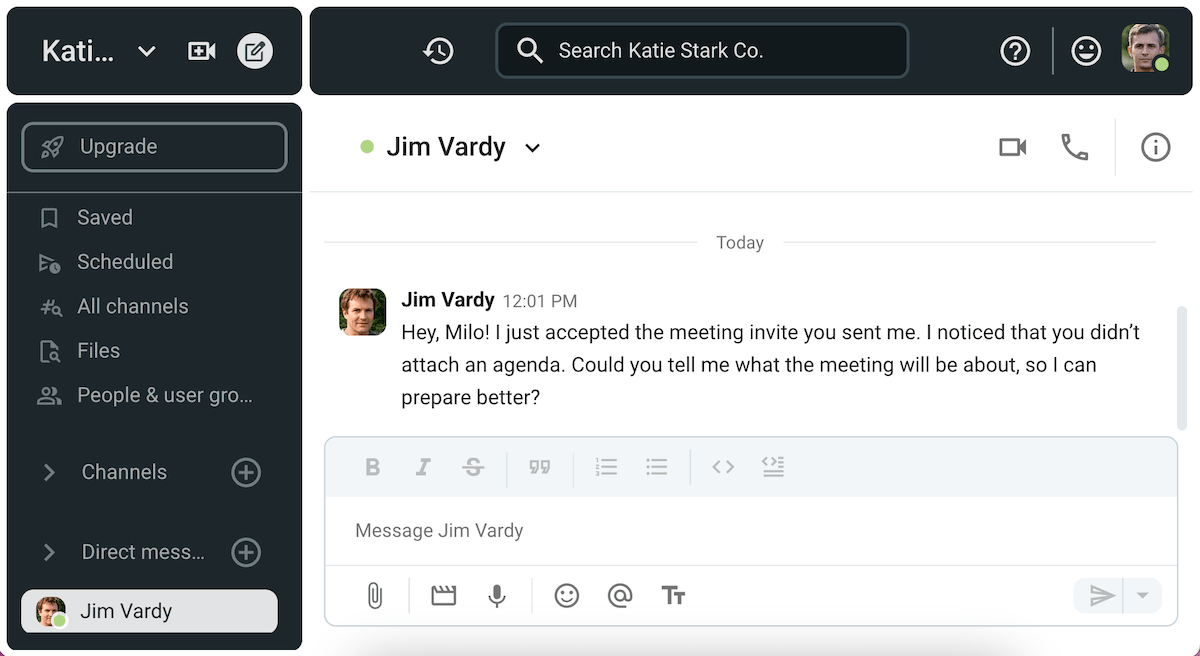
Conversely, if you’re the one requesting the meeting in question, you should take care to explain the purpose of the meeting to your invitee before scheduling the appointment.
To do that, you could either mention the reason you’re requesting the meeting in the text of your message or email or attach a virtual meeting agenda to your communication.
Share your meeting agenda easy and simple in Pumble
Tip #2: Research the person you’re meeting
If you’ve never had a chance to attend a skip-level meeting before, this could be the first time you’ll ever interact with the higher-up you’ll be meeting.
As such, it’s natural to feel some level of trepidation due to your lack of knowledge and familiarity with them.
To alleviate those concerns, Nikki Jain, a public relations professional who’s worked with over 25 PR agencies and 150 clients across the US, UK, and Australia, recommends doing your homework ahead of time:

“Understand what the higher-up cares about and how your points tie into the bigger picture.”
In other words, you might want to do some recon by:
- Looking into the skip-level manager’s position at the company to find out what they do,
- Checking out their LinkedIn profile for more information on their career path and insight into their personality, and
- Asking around the company to pinpoint their leadership style and get a better understanding of how they tend to communicate.
Doing this should help you understand how to position yourself at the upcoming meeting.
Tip #3: Ask your coworkers what to expect
Your coworkers can be a valuable resource to you as you prepare for your skip-level meeting.
In addition to sharing their insights regarding the person you’ll be meeting, they’ll also be able to tell you more about what you can expect to happen at the meeting in question.
After all, even if you’ve never had a skip-level meeting before, chances are, someone on your team has.
Here’s how you can ask for their advice over the company’s employee communication app.
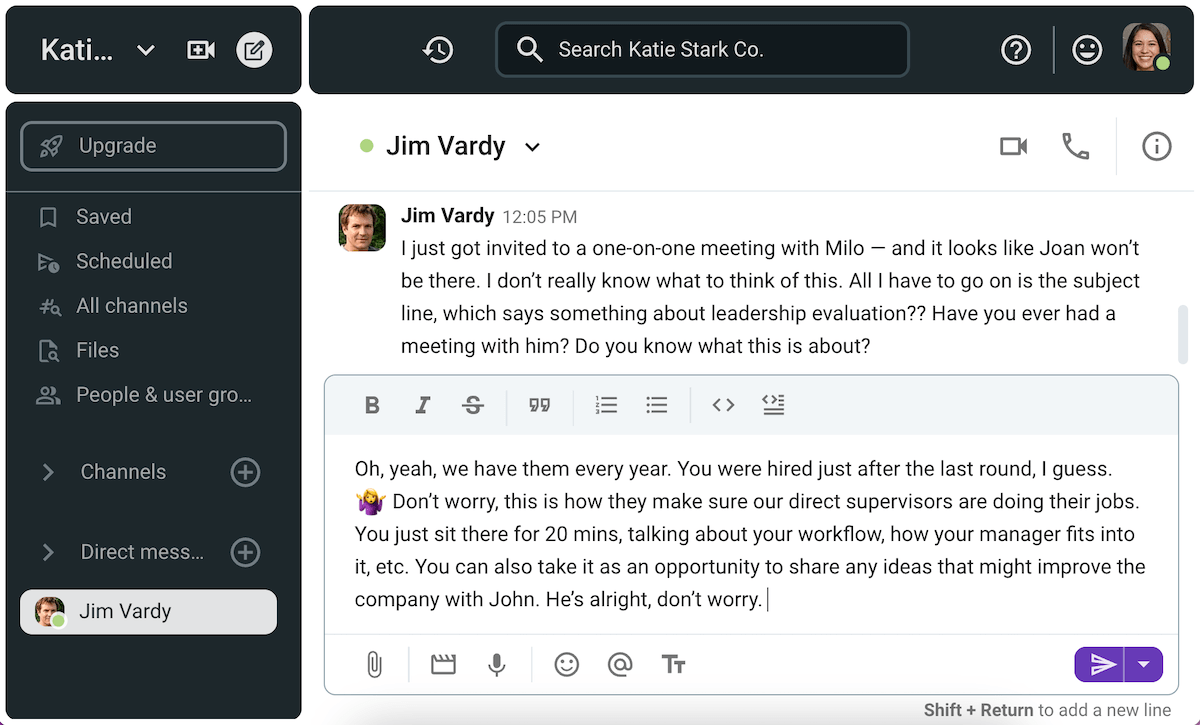
Tip #4: Prepare a list of things you enjoy about working at the company
If you find that the skip-level meeting you’ve been invited to is about sharing your feedback with the company, there are several things you might want to consider before the appointment.
Generally, it’s best to start with the positives, as Nikki Jain pointed out:

“Be real, but stay positive. Focus on solutions, not just problems.”
Sharing the things you like about your position or the company at large will show your skip-level manager that your intention is to share constructive feedback when you reach that point in the conversation.
Moreover, starting on a positive note should allow you to build rapport with the higher-ups you’re meeting, which is one of the main benefits of these kinds of meetings, as we’ll discuss later on.
Tip #5: Identify the difficulties you’re having at work
After going through the high points of your work, it should be okay to share some of the difficulties you might be having.
If you’re struggling to get your work done, whether it’s due to difficult coworkers, communication barriers, or a lack of resources, there are ways to say that without antagonizing anyone.
Whatever you do, you should strive to maintain respectful communication, as Robert Choi told us:

“Professionalism and respect are paramount, especially when discussing sensitive issues.”
However, Choi went on to note that you should still be as specific as possible when sharing that skip-level feedback:

“Reflecting on specific situations and preparing examples helps in making the conversation more concrete and actionable.”
Tip #6: Consider improvements the company could make
As we have pointed out, it’s important to make sure your intentions are clear when sharing your feedback with your skip-level manager.
That’s why you should lead with the positive aspects of your work, before noting any roadblocks you may be encountering.
But, don’t just leave it at that.
Your higher-ups will no doubt appreciate any suggestions you might have that could make you more productive.
If nothing else, coming up with potential solutions for the problems you’re having will let your skip-level manager know that you’re invested in the company’s success.
With that in mind, spend some time contemplating how you would solve the issues you’re having at work if you were the boss.
You could even make a note of those ideas by sending yourself a message on Pumble, the team communication app, as shown in the image below.
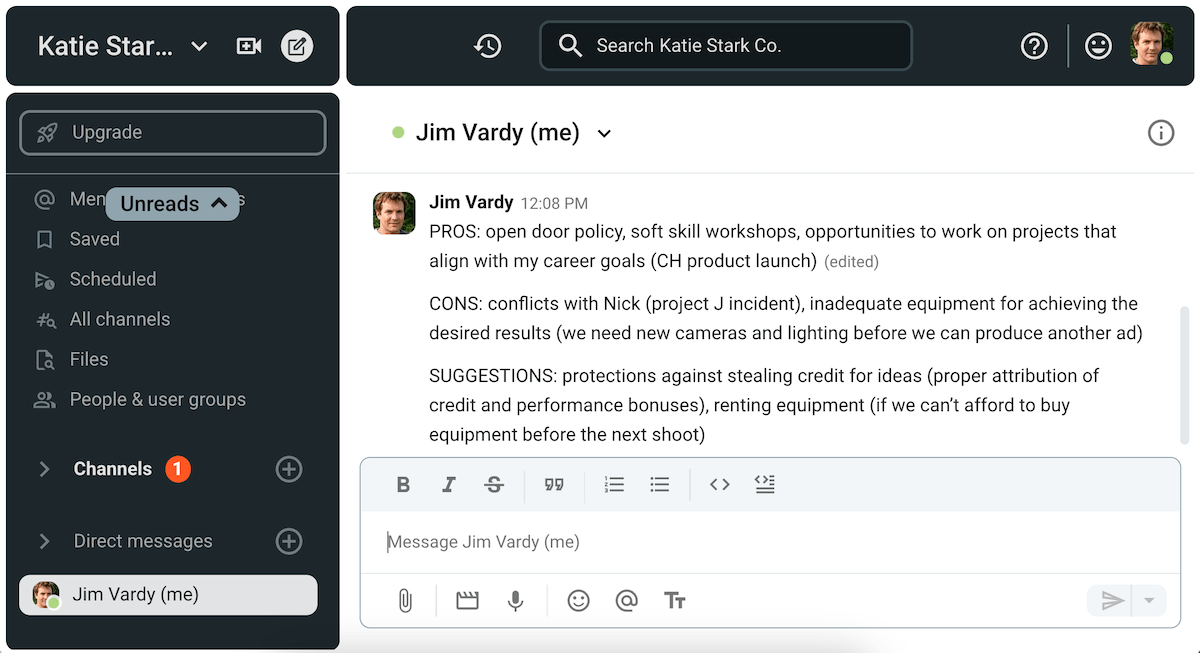
Never miss a reminder in Pumble, the business communication app
Tip #7: Compile a list of your achievements and consider your goals
If the skip-level meeting you’ve been invited to turns out to be your employee evaluation, you may be asked some questions about your performance as well as your future career goals.
With that in mind, you might want to think about your professional aspirations.
To spare yourself the trouble of having to remember all your previous achievements, you should keep track of all the work you’ve done.
While you do that, be sure to note the value your input has contributed to each project you’ve been involved in.
Having a record of your achievements will make it easier to extract those highlight reel-worthy moments — especially if you’re preparing to ask for a promotion.
And, in any case, anticipating some of the questions you may be asked is sure to leave a great impression, as Robert Choi told us:

“Anticipating potential questions and preparing thoughtful responses is key to making the most of these meetings.”
Tip #8: Come up with your own questions
Ultimately, skip-level meetings are a great opportunity to ask your boss’s boss any questions you might have about the company or your place in it.
If no questions are coming to mind, you might find some inspiration by thinking about the following questions posed by Robert Choi:

- “How does my role and work align with and support the overall strategic objectives of the organization?
- What are the significant challenges and opportunities I perceive from my position?
- How can I further develop my career and skills within this organization?
- What constructive feedback can I provide to enhance my role and the broader workplace environment?”
These questions might help you come up with some follow-ups you could ask your skip-level manager about.
Alternatively, you could always ask your team members what they’d like to know and pass the questions along at the appropriate time during the meeting.
Or, if you still can’t come up with anything, you can get inspired by our list of questions to ask a skip-level manager.
What to ask in a skip-level meeting as an employee?
Like any work-related appointment, skip-level meetings usually have several moments that allow employees to ask their questions.
To start with, you could break the ice with casual inquiries such as:
“What have you been up to? Any new hobbies?”
“I’m about to head down to lunch, I have a pair of tacos with my name on them. Have you tried the cafeteria tacos before?”
“What are your plans for the weekend?”
These kinds of questions are the perfect conversation starters to use at the beginning of the meeting.
Alternatively, they can be a good way to bring the meeting to a close without coming across as too abrupt.
However, during the meeting, you should stick to topics that are related to the manager you’re meeting with, the company, and your place within it, as Nikki Jain noted:

“Ask [your skip-level manager] about their vision:
- Where’s the company or your department heading?
- How can you help get there?
- What do they see as your role in the grand scheme?
- What challenges are they facing?
Maybe you’ve got a fresh take or solution they haven’t thought of.”
Having said that, let’s list some questions you can use to gather information or solicit feedback during a skip-level meeting.
More information-gathering questions to ask skip-level manager
“How did you come to work at this company?”
“What’s your favorite thing about your job?”
“What are you working on right now?”
“What are the main goals this company is currently trying to achieve?”
“Are there any big changes in the company structure or work processes that will occur in the next 6 months?”
“What are some changes you’d like to see in the company?”
“Do you think I/my team could improve any of my/our work processes or skills?”
“Is there any way for me to take on more responsibility in ___ department?”
“How can I be more involved in building the workplace culture in this company?”
“Does the company offer any mentorship opportunities to promising employees?”
💡 PUMBLE PRO TIP
If you’re looking for more questions you could ask during a 1-on-1 meeting with your superior, check out our previous article on that subject:
Free skip-level meeting templates
Whether you’re an employee or a higher-up, not knowing how to ask for a skip-level meeting via email is understandable — especially if you’ve never done it before.
Luckily, we’ve prepared several templates to help you draft your initial meeting request message.
Email template for employees requesting a skip-level meeting
When requesting a meeting with your skip-level manager, it’s best to keep your message short and sweet:
- Deliver a short greeting,
- Explain who you are and why you’re writing,
- Suggest a time and date for the meeting,
- Provide any pertinent documents, such as an agenda, and
- Deliver an appropriate sign-off.
Here’s an example:
Email subject: Requesting meeting to discuss design proposals
Email body:
Hello Mr. Green,
Hope you’re having a great week.
My name is Sabrina Day and I am a graphic designer working under Anne Maddox.
I’m writing to ask if you’d be willing to take a 1-on-1 meeting regarding my design proposal for the new product sometime this week — or at your earliest convenience.
I’ve attached an agenda of everything I’d like to discuss, for more information.
Please let me know when you would be available to take this meeting.
Awaiting your response.
Regards,
Sabrina Day
Graphic Designer at Katie Stark Co.
The particulars of this message will depend on a variety of factors, including your familiarity with the recipient of the email and your reason for writing.
Moreover, this template could just as easily be used to draft a direct message, which would have the added bonus of allowing you to drop the formal formatting, as seen in the image below.
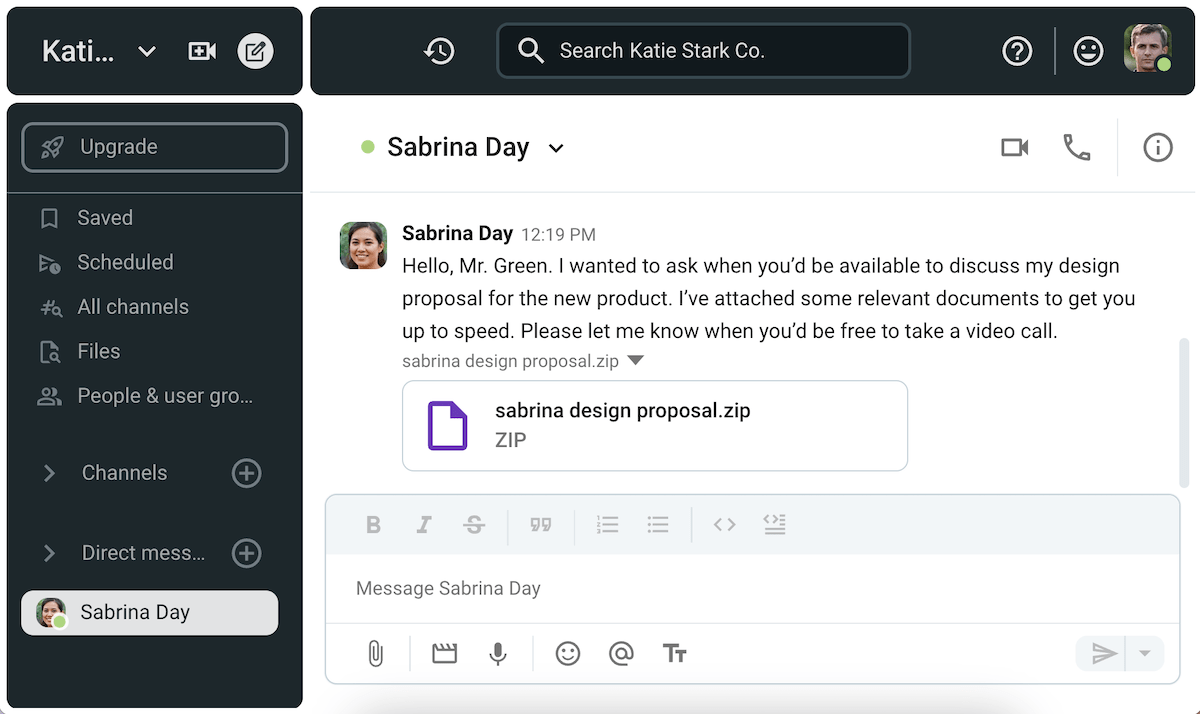
💡 PUMBLE PRO TIP
If you’ve never written any professional correspondence of this kind, the commonly used terminology may be a bit foreign to you. To get into the spirit of professional communication, check out our compilation of the most useful phrases to use during business meetings:
Email template for managers to directly contact skip-level meeting invitees
If you’re a manager looking to schedule a skip-level meeting, there are 2 ways to go about doing so.
The first route involves directly contacting the attendees, as seen in the example below.
Email subject: Meeting request: Leadership evaluation
Email body:
Hi Sabrina,
I’m writing to inform you that I’ve set up a 1-on-1 meeting that will take place next Wednesday, the 14th of February, at 1 p.m.
The meeting is part of an overall leadership evaluation process the company conducts every year to make sure our employees are getting what they need from management and leadership.
I’ve attached the questionnaire we usually go through during these meetings, and I implore you to spend some time contemplating the questions in it ahead of the meeting.
I also invite you to prepare your own questions for me, if there’s anything you’d like to discuss.
I’ve tried to make sure that these appointments work for everyone, but please feel free to let me know if you’d like to change the time and date of our meeting.
On the other hand, if you’re able to attend, go ahead and accept the meeting invitation email you’re about to receive.
Regards,
Milo Green
Supervising Manager at Katie Stark Co.
As we can see, people who are higher up on the company ladder tend to have more leeway when it comes to the kind of language they can use in their correspondence.
Rather than asking for a meeting, you can simply inform the attendees that you’ve scheduled one — while leaving room for them to request a different time.
Of course, this, too, can be done through a team communication app like Pumble.
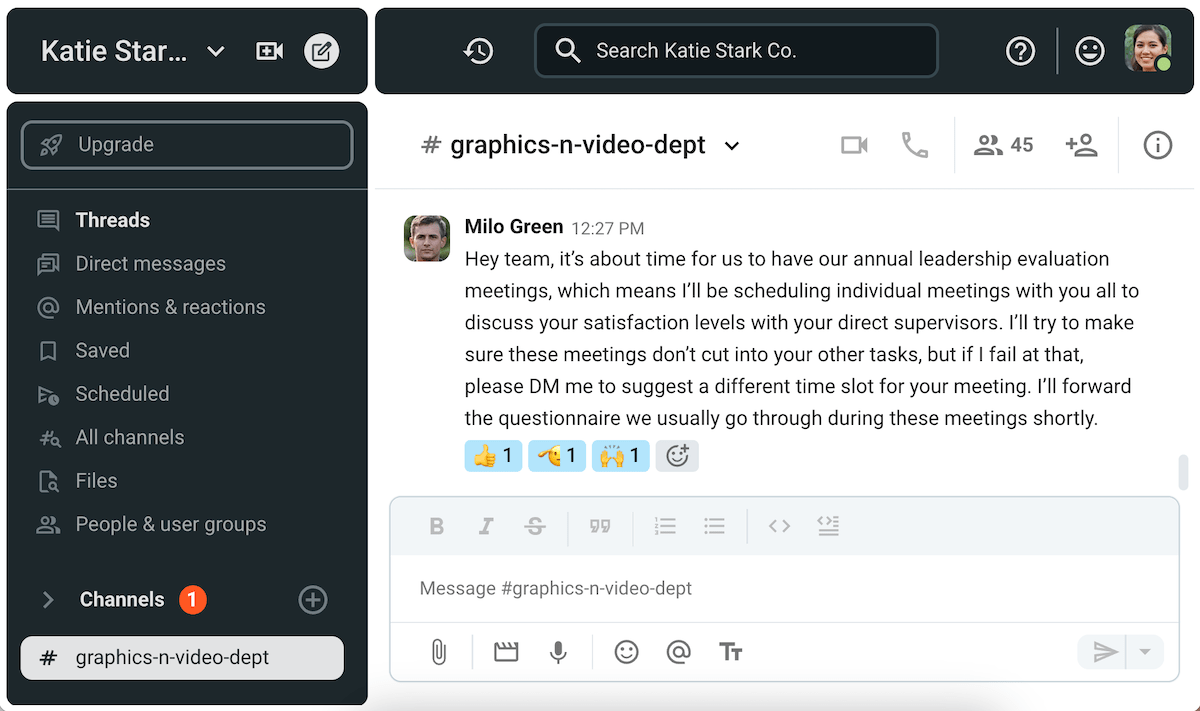
Share team announcements over Pumble
Email template for indirectly calling for a skip-level meeting
The other route you can take as a higher-up looking to call for a skip-level meeting involves going through the employees’ direct manager.
In that case, your email would be addressed to the manager in question, as shown below.
Email subject: Setting up a skip-level meeting with your team
Email body:
Hey Anne,
As we discussed at the meeting on Tuesday, it’s time to start our annual leadership evaluation process.
Please inform your team that they will be receiving meeting invitation requests from me so it doesn’t come as a surprise.
I’ll try to make sure the meeting time works for everyone, but please let them know that they can message me directly if the proposed time is inconvenient for whatever reason.
I’ve attached an agenda to this email, so I’d be grateful if you could pass that along to your team as well.
Thank you for your assistance in this matter.
Kind regards,
Mike Martin
Supervising Manager at Katie Stark Co.
By having the meeting invitees’ direct supervisor handle some of these tasks, you’ll be able to focus solely on preparing an effective meeting.
Meanwhile, the recipient of your email might communicate your decision with their team, as shown in the image below.
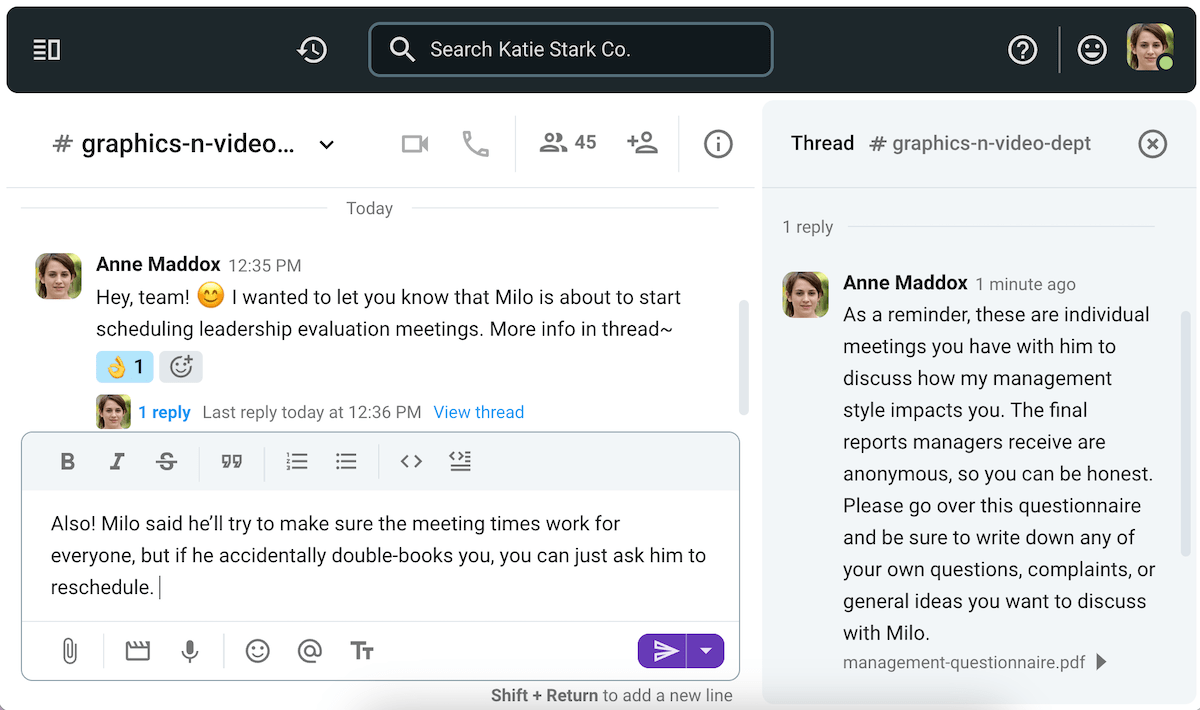
💡 PUMBLE PRO TIP
Ultimately, the templates we’ve provided can be used as a jumping-off point when writing a meeting request email or message. But, if your email recipients don’t respond for whatever reason, here are some templates you can use to circle back:
Skip-level meetings: Pros and cons
Now that you know how to set up a skip-level meeting, let’s talk about whether you should.
After all, according to Pumble’s 2023 Meeting Statistics, unproductive meetings can cost businesses billions of dollars annually.
But, if we want to determine whether the benefits of skip-level meetings outweigh the drawbacks, we have to dive into the pros and cons.
So, let’s begin by taking a look at the benefits.
The benefits of skip-level meetings
In the words of Nikki Jain, the greatest benefit of skip-level meetings is that they cut out the middle man:

“It’s like getting a backstage pass. You get firsthand insights from higher-ups, and they get to hear what’s really happening on the ground. It can be a great reality check for everyone and can make you feel more connected and valued.”
In addition to boosting employee engagement and building trust, these meetings can also break down team silos, as Robert Choi noted:

“[Skip-level meetings] encourage open communication, breaking down silos within the organization. This has been crucial in fostering a collaborative culture in the places I’ve led.
They provide direct insight into the ground realities of the organization, which is often more candid than what I might receive through filtered channels.
They serve as a platform for recognizing and nurturing potential leadership talent among the workforce.”
Choi also went on to say that these benefits are particularly important for workers in the public sector, as they encourage a more integrated approach to work, devoid of bureaucratic barriers.
So, basically, skip-level meetings:
- Encourage open and transparent communication,
- Make employees feel like their opinions matter to their superiors,
- Give higher-ups more insight into what’s happening with employees,
- Foster a sense of belonging and connection between employees and higher-ups,
- Allow higher-ups to recognize and nurture leadership qualities in management and employees, and
- Allow the participants to exchange constructive feedback — or, rather, feedforward.
The disadvantages of skip-level meetings
According to Elena Sarango-Muniz, skip-level meetings can only go awry if the feedback that is shared during the session is not taken into consideration by leadership:

“There are no cons [to] scheduling skip meetings. The problems arise when the leader doesn’t do anything with the feedback received.”
But, that isn’t the only potential drawback you might face.
For example, Nikki Jain notes that skip-level meetings might ruffle some feathers and make managers feel excluded:

“It can ruffle some feathers. Your direct boss might feel sidelined or worried about what you’re saying to their boss.
Plus, it can set off a game of expectations — you might think this chat will change the world, but it might just be a good conversation and nothing more.”
Robert Choi also noted these potential drawbacks:

“If not handled with care, [skip-level meetings] can unintentionally undermine the authority of direct supervisors, something I’m always cautious about.
Miscommunication or misinterpretation of information can occur, especially if the context is not clearly established.
Managing expectations is a challenge; it’s important to ensure that these meetings don’t lead to promises that can’t be realistically fulfilled.”
Furthermore, Choi mentioned that skip-level meetings can create perceptions of favoritism, particularly in the public sector:

“There’s a risk of creating perceptions of favoritism or bypassing established protocols, which can be sensitive in a public sector context.”
In other words, skip-level meetings can:
- Create perceptions of favoritism,
- Foster misunderstanding and disappointment,
- Exclude direct managers from issues that concern their team, and, ultimately,
- Fail — if the feedback that was shared is not taken into account properly.
Should I tell my manager about the skip-level meeting?
Now, if you’re a regular employee looking to schedule a meeting with your boss’ boss, you might find yourself wondering whether you should inform your direct supervisor about it.
As we have just learned, your manager may feel excluded if the meeting takes place behind their back.
That’s why Nikki Jain recommends that you go ahead and let your manager know what’s happening:

“Generally, yeah, give your boss a heads-up. It shows respect and keeps things transparent. Just frame it right – it’s not about going behind their back, but about getting broader insights or advice. It’s about making things better for everyone, not just airing dirty laundry.”
Robert Choi was of a similar opinion, emphasizing the importance of following protocol:

“I believe in maintaining an open line of communication with my direct manager regarding skip-level meetings. It’s important to convey that the intent of these meetings is to contribute constructively to both personal and organizational growth, not to bypass or undermine the established chain of command. This approach not only maintains transparency but also ensures that the manager is aware and supportive of such initiatives.”
Of course, depending on the purpose of the meeting, you may not always feel comfortable with telling your manager about it.
After all, as Elena Sarango-Muniz noted, skip-level meetings aren’t always about the manager:

“It depends again on what was the purpose of the meeting; it isn’t always about talking to the manager’s boss about them. A successful skip meeting is a positive, forward-looking one.”
So, if the skip-level conversation you’re about to have simply doesn’t concern your manager, you may be able to get away with not mentioning it.
How to have a skip-level meeting through Pumble
Nowadays, most businesses have gone at least partially virtual, having transitioned to either a full remote or hybrid work model.
If your company has done the same, you may find yourself using a video conferencing app to attend your skip-level meetings.
Having said that, we wanted to share a few tips that would enable you to use Pumble, our workplace communication app, to successfully plan and conduct your skip-level meeting:
- If your company has an open-door policy in place, you should be able to simply open a direct message with your skip-level manager and ask them whether you can schedule a meeting with them. You could even use the templates we have provided to come up with an appropriate meeting invitation message.
- As a higher-up, you can announce your plans to schedule a skip-level meeting on team channels and get into specifics in threads. You can also share any documents, such as the skip-level meeting agenda, in the message for everyone to see.
- After you get the go-ahead from the meeting invitees, you can start a meeting immediately, by using the meeting link feature, or schedule it through Google Calendar, using the Pumble add-on.
- Lastly, you can use Pumble’s reliable video conferencing feature to conduct your skip-level meeting. So, brush up on your virtual meeting etiquette!
Make the most out of your next skip-level meeting.





